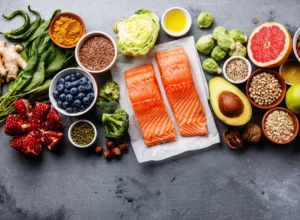
Science Backed Tips for Losing Belly Fat

The excess weight in the midsection of the body is referred to as belly fat. This fat often comes in two different types. Approximately 90% of the fat is subcutaneous fat, which is the first type. Visceral or intra-abdominal fat makes up the remaining 10%. This deep-seated belly fat may raise the risk of conditions like colorectal cancer, heart disease, and Type 2 diabetes because it collects around important organs like the pancreas, liver, and intestines.
Table of Contents
Introduction
To make a noticeable weight loss diet plan for women, a balanced diet and frequent exercise are essential. Although it is not feasible to target fat in particular regions of the body, there exist methods for decreasing total body fat, which consequently reduces visceral belly fat. A balanced and nutrient-dense diet is ensured via meal planning. You can prevent overindulging or impulsive eating by doing this and making healthier meal choices.
Limit Unhealthy Beverages or Alcohol
Steer clear of sugary beverages, flavor-infused energy drinks, and packaged fruit juices. Although these juices promote themselves as healthful, they are heavy in simple sugar and calories. To reduce calorie intake, eat entire fruits instead of store-bought juices. Carbonation has no calories, yet it can cause tummy bloating. It is crucial to completely abstain from fizzy beverages as a result. Monitoring alcohol intake is also necessary because excessive alcohol use can increase belly fat, especially in middle-aged males.
Tips to Lose Belly Fat Portion Control

The first step to a good weight loss plan for women is portion control or mindful eating. Meal portioning can aid in weight loss by regulating calorie consumption. When following portion control, keep a tight eye on the carbohydrates. Reducing your intake of simple carbs like fruit juice and sweets is a wise move, but following a low-carb diet is not required. Rather, choose sources of carbohydrates including vegetables, whole grains, and beans and legumes.
Include More Fiber

It’s no secret that fiber has several advantages. Fibre helps lessen bloating and strengthen the digestive tract. Based on scientific studies, fiber may help control blood sugar, cholesterol, weight, and obesity. Merely upping the amount of fiber you eat can help folks who find it difficult to maintain a tight diet lose weight. Try to consume between 25 and 30 grams of fiber every day.
Consume a Protein-rich Diet

Because it increases metabolism and reduces cravings and hunger pangs in between meals, a high-quality protein diet aids in weight loss. Additionally, the significant thermic action of protein aids in calorie burning. Aim for 10 grams of protein for snacks and 20 to 30 grams of protein for meals. After consuming enough protein, people no longer seek refined carbs or foods high in trans fats and instead feel satisfied.
Engage in Cardio and Strength Training

Exercise is the main factor in weight loss, especially when it comes to belly fat reduction. Combining weight training with cardiovascular activity will yield the best benefits. Start with 150 minutes a week of moderate-to-intense aerobic exercise or 75 minutes a week of vigorous exercise, including two days dedicated to muscle-building exercises.
Quality Sleep

Getting enough sleep each night is essential. Research indicates that a lack of sleep causes the body to store fat and gain weight via accumulating visceral fat. Adults under 40 who sleep fewer than five hours every night have much higher visceral and subcutaneous fat accumulation.
Foods to Eat

Foods high in fiber, with moderate quantities of protein and good fats, can help reduce body fat generally, which in turn can help reduce belly fat, even though there are no foods that specifically target this goal. They include things like eggs, veggies, berries, lean protein, avocados, oats, and chia seeds. Furthermore, cutting belly fat and total body fat might be aided by incorporating apple cider vinegar into the diet. Reducing weight and abdominal fat is another benefit of probiotics. Low-fat yogurt, according to medical professionals, can aid in weight loss and the reduction of belly fat.
Drink Enough Water

Reducing calorie intake can be achieved by eating adequate amounts of water. By increasing one’s water intake, one’s feeling of fullness decreases their appetite and reduces their desire to snack. In addition, a well-hydrated body functions better. Activity trackers, such as smartwatches and the healthify me app, assist in monitoring physical activity, promoting daily mobility, and assisting users in maintaining accountability. They encourage people to meet their fitness objectives by giving them immediate feedback, which helps them lose weight fast.
Note: There might be affiliate links mentioned here. We may receive a commission if you purchase a product through an affiliate link. There is no additional charge for you. Please do your own research before making any online purchases.
Try Intermittent Fasting

In terms of successfully reducing weight, timing one’s meals may be equally as important as what is consumed. Intermittent fasting is a periodic pattern of eating and fasting. When fasting, individuals typically designate a specific eating window during which they eat all of their meals and snacks. Improved insulin sensitivity and hunger signaling are two further possible benefits of this eating pattern. A time window that suits your daily schedule should be found. But, since eating too close to bedtime can disrupt your sleep, try to avoid doing so.
Benefits of Setting up Weight Loss Goals?
Helps to Measure Progress
![]()
Setting measurable objectives is crucial. Individuals can keep track of their accomplishments, pinpoint areas for growth, and maintain motivation by regularly evaluating their progress toward these goals. This quantifiable structure promotes accountability and directs sensible modifications for long-term advancement.
Provides Motivation and Focus

Establishing objectives for weight loss gives you a clear path forward and increases motivation and focus. A feeling of purpose that comes from having clearly defined goals makes it easier for people to monitor their progress, recognize their successes, and remain committed to their fitness journey—all of which increase the chances of success.
Improves the Prospect of Long-term Success

Long-term success is encouraged by setting attainable and sustainable goals. An approach with goals promotes the formation of good habits that help with long-term weight management rather than only concentrating on quick fixes.
Presents Guidance for Action

Your actions and decisions are guided by your weight loss goals, which operate as a roadmap. Knowing your goals allows you to adjust your lifestyle choices, exercise regimen, and food to meet your desired results.
Ingrains Accountability

Having clearly defined goals helps to hold people accountable for their development. Frequently evaluating oneself about these objectives fosters dedication, identifies opportunities for enhancement, and enables people to assume responsibility for their well-being, thus strengthening a feeling of responsibility in their efforts to lose weight.
Conclusion
It is not a smart idea to approach losing weight by restricting your diet to only one type of food. When it comes to lowering belly fat, cutting back on carbohydrates and upping fiber and protein consumption works better than a low-fat diet. Try to get in at least 30 minutes of moderate-intensity activity most days of the week. Please consult a healthcare expert to ensure that making a substantial dietary adjustment won’t put your health at risk. Keep in mind that long-term weight loss requires patience and that your entire health and well-being should come before the number on the scale. Before making big dietary or activity changes, speak with medical professionals, particularly if you have underlying medical concerns.
Disclaimer: The information provided in this article is for educational purposes only and should not be considered as a substitute for medical advice. Consult a healthcare professional before implementing any home remedies or making significant changes to your lifestyle.






